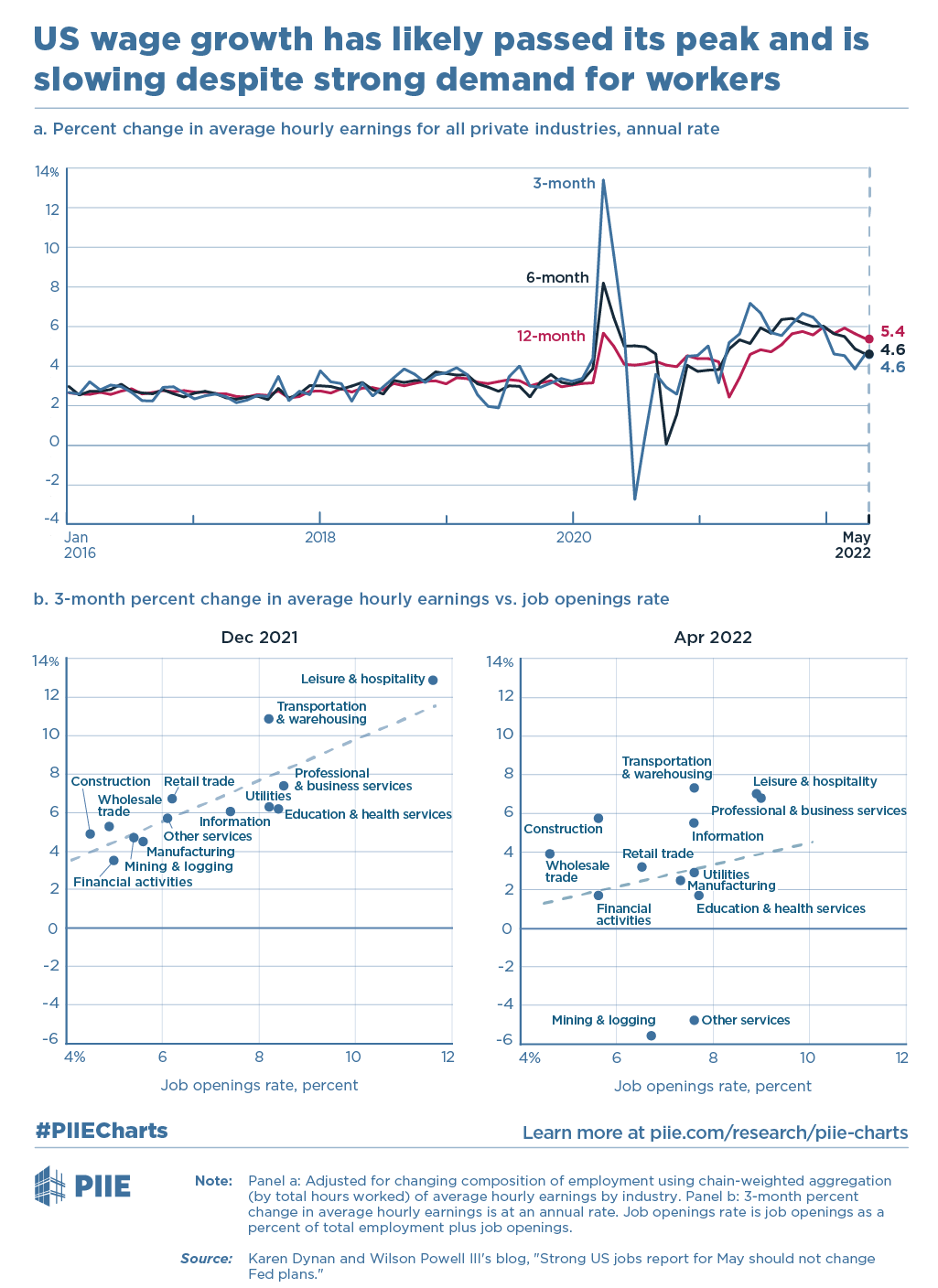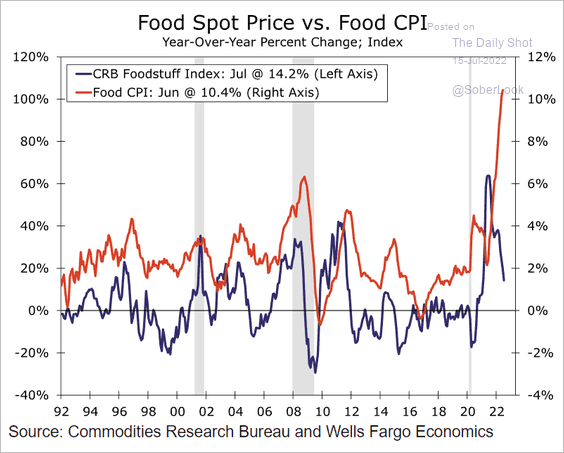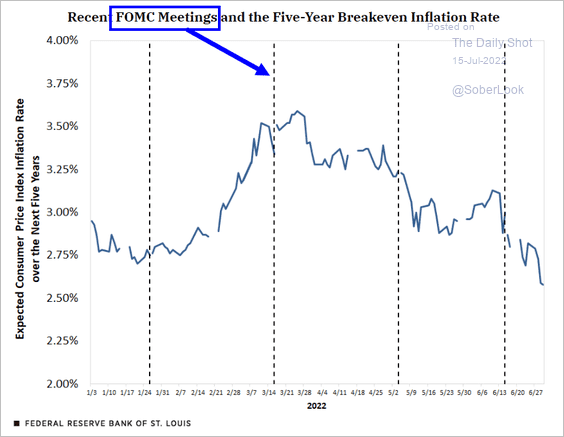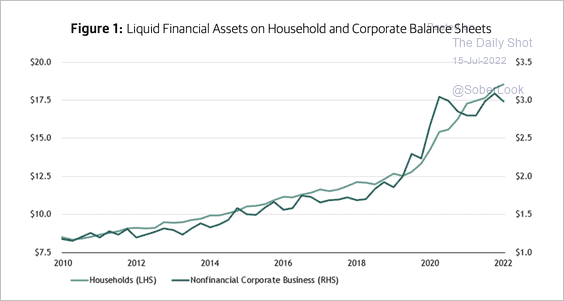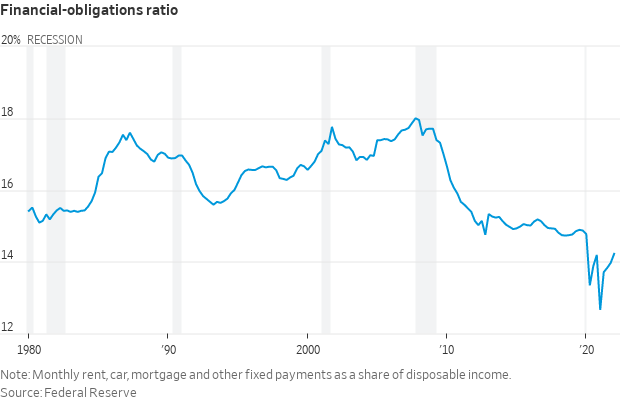July 16
The truth is that nature, genetics, and family structure matter most when it comes to education and later life achievement. Or as Freddie deBoer puts it: most kids slot themselves into academic ability bands early in life and stay there throughout schooling.
We have a certain natural level of performance, gravitate towards it early on, and are likely to remain in that band relative to peers until our education ends. There is some room for wiggle, and in large populations there are always outliers.
Imagine an America if 99% of people adopted the culture of hard work, meritocracy and the Golden Rule.
Contrast that ‘utopia’ to today’s woke America, ‘socialism’, incivility, and enabling behavior which undermines social welfare and cohesion.
China
China has problems, and that delights me. The country is caught in the middle income trap, from which it will not escape. It no longer enjoys a comparative advantage over the U.S. on wages. And its wage structure is at a comparative disadvantage relative to other middle income countries, particularly those of Southeast Asia. Its population is aging. The central government allocates capital poorly, favoring state owned enterprises, SOE, over the more efficient and dynamic private sector; thus undermining long run productivity. The rule of law is non existent.
At the moment, China faces yet another property and banking crisis.
Bank runs, including on the Bank of China, are happening all over China. It is important to note that the Chinese banking system represents 350% of Chinese GDP (on balance sheet) while the US system is only 100%. One of the largest lending categories of Chinese banks is real estate. Chinese property one third of that. Developers are filing bankruptcies at a record pace. Moody’s has downgraded 91 Chinese property developers this year alone, while Moody’s had only downgraded 54 over the past decade before this year’s actions. China’s banks are insolvent.
The Chinese economy grew this spring at its slowest rate since the beginning of the coronavirus pandemic, a sharp slowdown from a Covid-19 policy that continues to prompt widespread lockdowns and mass quarantines, bringing some business activity to a halt.
The National Bureau of Statistics said on Friday that the economy expanded 0.4 percent from a year earlier in the second quarter, the lowest rate of growth since the first three months of 2020.
The current outlook is not so promising. Unemployment is close to the highest levels on record. The housing market is still a mess, and small businesses are bearing the brunt of weakness in consumer spending. See NYT.
Europe and Germany have problems too. The Eurozone faces another sovereign debt crisis. Prices for credit default swaps to insure against default by Italy and Greece are increasing. The market knows that rates must go up in the Eurozone to prevent entrenched high inflation. But the periphery countries of the Eurozone cannot tolerate higher rates given their already too high debt to GDP ratios. In the meantime, the countries of Europe import inflation because oil is priced in dollars and the Euro is weak, trading at a 20 year low against the dollar.
Equally important, many countries in Europe, particularly Germany may run out of energy this winter. The Economist magazine says:
In Europe we look ahead to the bitter energy shock that is in prospect. You may be sizzling on a Mediterranean beach or slow-roasting on the streets of Berlin, but winter is coming, and it promises to be brutal and divisive. As Vladimir Putin strangles supplies of Russian gas to Europe, the warning signs are flashing red.
Prices for delivery of gas this winter, at €182/mwh ($184/mwh), are almost as high as in early March, after Russia invaded Ukraine, and seven times their long-run level. Governments are preparing to rescue crippled utilities in France and Germany, and some investors are betting on which industrial firms will go bust later this year as rationing takes hold.
Several calamities in the past decade have come close to ripping Europe apart, including the euro crisis in the early 2010s and the migrant crisis in 2015. The winter energy shock of 2022 could yet join them. Once again, the continent’s unity and resolve are to be tested.
In Germany’s case the wounds are self inflicted. German politicians turned “quisling” and shuttered Germany’s nuclear power plants in return for cash payments from Russia. German politicians decided to become completely dependent on cheap Russian energy.
This winter political cohesion between Europe and the US will be strained. Germany, France and Italy will want to surrender to Putin. The US won’t surrender. Britain, Poland and the Baltic states won’t surrender. The fighting will continue. The German economy may buckle. That thought delights me. For too long, I have listened to BS about Frau Merkel, in truth a pawn of Putin.
Markets and Stocks
Inflation’s back is broken. Wages are 70 percent of costs in the economy.
There are signs that the pace of wage growth in the United States may have passed its recent peak. Overall growth in private-sector earnings has retreated from 2021 levels, and earnings growth has slowed, even in sectors that continue to have high rates of vacant positions.
After adjusting for changes in the composition of employment, the 12-month change in average hourly earnings fell from 5.6 percent in April to 5.3 percent in May, and the 6-month change showed a similar decline. The 3-month change increased to 4.6 percent from 3.8 percent (as February's unusually low earnings growth dropped out of the average), but it remains well below its 2021 peak of over 7 percent. Wages are still growing faster than before the pandemic, but they appear to be decelerating.
In late 2021, sectors with higher rates of job openings were experiencing faster wage growth than other sectors. Recently, however, firms appear less inclined to raise wages to fill vacant positions, and that relationship has now weakened. This suggests that, while labor demand remains high, firms are less desperate to fill openings, perhaps because of concerns that demand for their products may soon fall if the Federal Reserve raises interest rates.
Food prices will fall, following the sharp drop in prices for agricultural commodities.
Prices for industrial metals have dropped like a stone. Copper traded on the London Metal Exchange is down more than 25% this year and is on pace for its biggest annual decline since 2008, the height of the financial crisis.
The decline is part of a broader sell-off in industrial metals. An index of the six metals traded on the LME, including aluminum, copper, zinc, nickel, tin and lead, is down 23% this year. Benchmark steel prices in the US have dropped more than 36%, while iron ore has declined 19%.
Inflation expectations have responded to Fed tightening.
Demand for gasoline is falling in the US. The oil bulls don’t talk about that reality. The national average gas price at the pump is $4.605 a gallon, down 42 cents from its peak, according to AAA. At the same time, the U.S. average for product supplied—a proxy for demand—is at 18.7 million barrels a day, its lowest since June 2021. Remote work has reduced structural demand by 4-6 percent. See Barron’s. At the same time, US oil production continues to climb.
The Fed will raise rates by 75 basis points when it meets on July 27. It will raise rates by 50 basis points in September. But I predict that Fed Chair Powell will signal in the middle of September that most of the tightening cycle is over.
Jeremy Siegel is right. “Those policy changes so far have been good. We’ve slammed on the monetary brakes, the money supply, deposits in banks, to absolutely flatten it out,” he said, referring to the overheated post-pandemic economy. “I have not seen that in any of the statistics I’ve been following for the last 50 years.”
Now, he said, it’s time to readjust. “But it also means that you’ve got to be very, very careful for what that means for the economy.”
The Fed does not want to drive the US economy into a deep recession.
Sometime soon the market will pop.
There will be a shallow recession, but households and corporations have solid financial buffers against a slowing economy.
Economics
Free trade is good. Protectionism is bad. Free trade benefits the many. Protectionism benefits the few and fuels inflation.
Critics of globalization often assert that growth in cross-border trade and investment started a race to the bottom where countries undercut each other in wages and labor standards, leaving poor and rich alike worse off. But a race to the top would be a more accurate description, as almost every country is richer today than four decades ago, before globalization gathered momentum.
The United States, Western Europe, and other advanced economies were richer in 2000 than in 1980. Middle-income countries were growing, albeit more slowly, and China was making incremental gains as it opened its economy.
By 2019, the effects of globalization had been realized; middle-income countries unlocked higher growth rates, and lower-income economies, including China, India, and others in Africa and Asia, had made significant strides in raising their incomes and reducing poverty.
The gains made across the world's income distribution demonstrate that, contrary to what some believe, lower-income countries did not get richer at the expense of rich economies, nor did expanding global trade become a new form of colonialism, enriching high-income economies at the expense of the developing world. More open markets lifted incomes around the world, and recent attempts to reverse this economic opening risk jeopardizing that progress. See the Peterson Institute.
Trade protectionism is like the atavistic emotion of hate, it feels good but ultimately it is bad, very bad. Can we have a little higher order reasoning?
Politics
The Economist magazine encourages Democrats to move to the center. The magazine says: that the Democrats urgently need to take on their own activists. The Economist does not usually hand out advice to political parties, but America’s sickly politics requires urgent care. It will not come from the Republicans—at least for as long as they pander to their base by embracing Donald Trump’s baleful influence even after he nearly overthrew the constitution. The Democrats therefore rightly see themselves as the remaining guardians of America’s political system. And yet they have also fallen prey to their activists. Fringe and sometimes dotty ideas have crept into Democratic rhetoric, peaking in the feverish summer of 2020 with a movement to “defund the police”, abolish immigration enforcement, shun capitalism, label women as birthing people and inject “anti-racism” into the classroom. If President Joe Biden wants to save the soul of the nation he will have to start with the soul of his own party.
The Economist has a slightly left of center take on most matters. The weekly news magazine is arguably the world’s best publication on the principal topics of day.
Soon, The Economist will again urge conservatives to push back against right wing Republican populists who reject free market capitalism, the rule of law and the Constitution. Trump is worse than Biden, a lot worse. DeSantis is only slightly preferable to Biden.
Can’t the country find a true moderate who believes in markets and the Constitution ? Where is today’s JFK, Clinton or Eisenhower?
Is Senator Sinema the real deal? Or is Governor Sununu the white knight?
Sociology
In 1965 Daniel Patrick Moynihan wrote about racism and the Negro family. His words were prophetic. Progress has been made on racism but the disintegration of the Black family in major cities continues, in truth it is accelerating. How to reverse the tide is a challenge for the country.
The United States is approaching a new crisis in race relations.
In the decade that began with the school desegregation decision of the Supreme Court, and ended with the passage of the Civil Rights Act of 1964, the demand of Negro Americans for full recognition of their civil rights was finally met.
The effort, no matter how savage and brutal, of some State and local governments to thwart the exercise of those rights is doomed. The nation will not put up with it — least of all the Negroes. The present moment will pass. In the meantime, a new period is beginning.
In this new period the expectations of the Negro Americans will go beyond civil rights. Being Americans, they will now expect that in the near future equal opportunities for them as a group will produce roughly equal results, as compared with other groups. This is not going to happen. Nor will it happen for generations to come unless a new and special effort is made.
There are two reasons. First, the racist virus in the American blood stream still afflicts us: Negroes will encounter serious personal prejudice for at least another generation. Second, three centuries of sometimes unimaginable mistreatment have taken their toll on the Negro people. The harsh fact is that as a group, at the present time, in terms of ability to win out in the competitions of American life, they are not equal to most of those groups with which they will be competing. Individually, Negro Americans reach the highest peaks of achievement. But collectively, in the spectrum of American ethnic and religious and regional groups, where some get plenty and some get none, where some send eighty percent of their children to college and others pull them out of school at the 8th grade, Negroes are among the weakest.
The most difficult fact for white Americans to understand is that in these terms the circumstances of the Negro American community in recent years has probably been getting worse, not better.
Indices of dollars of income, standards of living, and years of education deceive. The gap between the Negro and most other groups in American society is widening.
The fundamental problem, in which this is most clearly the case, is that of family structure. The evidence — not final, but powerfully persuasive — is that the Negro family in the urban ghettos is crumbling. A middle class group has managed to save itself, but for vast numbers of the unskilled, poorly educated city working class the fabric of conventional social relationships has all but disintegrated. There are indications that the situation may have been arrested in the past few years, but the general post war trend is unmistakable. So long as this situation persists, the cycle of poverty and disadvantage will continue to repeat itself.
The thesis of this paper is that these events, in combination, confront the nation with a new kind of problem. Measures that have worked in the past, or would work for most groups in the present, will not work here. A national effort is required that will give a unity of purpose to the many activities of the Federal government in this area, directed to a new kind of national goal: the establishment of a stable Negro family structure.
https://www.dol.gov/general/aboutdol/history/webid-moynihan
August 28, 2014, Calhoun 8:30 PM
It is raining steadily. The sound of the rain calms me. It takes me away from here. It is like those recordings that help a person sleep. I will close now and resume writing in the morning.
August 29 5 AM. The lights came on at 4 AM. A new work week begins. I have made my bunk. I will start to clean the bathroom shortly. We won’t go to breakfast for another 45 minutes or so.
I wait for the breakfast call. I continue to clean the bathroom. Outside I know that the air will feel cooler and fresher. I’m looking forward to the smell of fresh rain on the lawns. Even in prison I can appreciate the beauty of nature.
5:40 AM breakfast is over. I ate oatmeal and one pancake without syrup, the pancake was actually pretty good. The dawn sky was beautiful, clear sky, stars very low on the horizon. It is still dark here at 5:40. I saw Venus and slightly above and to the right I saw Jupiter. I always try to focus on the beauty of nature.
The officer in charge put the TV on. The weather person says it will be a warm but not steamy day. Humidity will be lower, thank heavens this place is hot. Currently it is 75°, the high will be about 94.
7 AM Calhoun it is 8 AM in Naples. The Panhandle is in a different time zone. It is a beautiful morning here. Through the window, I see a clear blue sky, outside the birds are singing.
I will order the portable Sony radio. The total cost of the radio and a spare headset will be about $50. I am all set on my account for a month or so.
I was also told by Tito, the nice man in the bunk next to me that I should order a set of thermal underwear. I will do so, he says it gets cold in the Panhandle. (He was right.)
Tito shows me the ropes. He is retired from Marine Corps. He did 20 years. He has citations. He has two children ages 28 and 22. He seems to be about 50 years old. He told me to guard carefully what I buy. He says there are vultures everywhere. For example he told me never to buy 20 envelopes and 20 stamps. He says that it’s too tempting for the guys. I ignore him. I want those stamps. I want those envelopes. I lock them away in my locker.
He also said that when the radio arrives at the personal property depot, to take a towel with your bag so that no one sees you bring the radio into the dorm. He says men will try to steal the radio. They are vultures. He says never loan your radio anybody. They won’t return it. From past experience here and in the Lee county jail he’s become very wary. The men in prison are nasty.
He told me that a few months ago someone took his inmate ID card, went to the canteen and charged $80 against his account. I never let my inmate ID card out of my sight. (Except the time I put it in the laundry by mistake, boy is that a day I wont forget.)
Outside the weather is gorgeous. There is a northerly breeze and the sky is bright blue. We are scheduled for an afternoon Rec. I doubt if it will happen. It will be too muddy.
11 AM I finished cleaning the bathroom. I have a reasonably good book to read. I am content. Another day is passing. I will accept. I will abide. I am Y54939. This is my life for another 212 weeks, 1484 days.
I was always good at counting. Some of the guys in prison didn’t know how to count, they didn’t know what day it was or how long they had been there. They did not know how long they had to go. Some would never go home, they had no date to count to.


